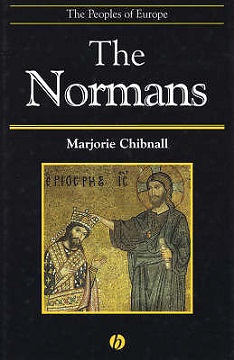
The Normans
Marjorie Chibnall
191 pages including index
published in 2000
So the Normans eh? Bunch of Vikings who plundered the English and French coasts for a while, before the king of France made an offer they couldn’t refuse and they settled in what became Normandy, named after them, to defend France against, well, other Vikings. Traditionally this is supposed to have happened in 911 CE. unlike other Scandinavian invaders attempting to set up stock in the countries they raided, these Vikings not only survived but thrived, creating essential a new people, the Normans and a new country, Normandy, in the process. Not only did Normandy become a powerful duchy, more or less indepdent from the kingdom of France, from there on William the Conqueror went on to take over England and Wales and invade Ireland, while other Normans went on to the Mediterranean and found kingdoms in Sicily and Antioch.
What the Normans managed to do looks a whole lot like what earlier “barbarian” invaders like the Goths did to the Roman empire, grabbing a piece of it and settle there in return for protection against other “barbarians”. But, as Marjorie Chibnall explains in her book, the Normans were “a product, not of blood, but of history”, not so much a people on the move as in the “classic” — and quite likely never to have happened in that form — people movements of Late Antiquity. Instead, it was a tightly knit group of warriors loyal to a specific ruler which took over and created Normandy, mixing with and ruling over the original populations. It was similar ties between ruler and noblemen that would later enable William the Conqueror to win the English kingdom.
A slight digression. I’ve been attempting to play a computer game called Crusader Kings II, which starts at roughly the conquest of England. At first glance this looks a standard grand strategy game, where you take control of a medieval country or duchy and attempt to conquer Europe from it, but which instead turns out all to be about building up your family and feudal ties and making your family the most prominent and powerful in Europe. It was hard to get into the mindset, but The Normans helped me a lot with this.
Because as said, if you trace the history of the Norman conquests after they’d been established in Normandy, it’s not a people or even a country going out to conquest, but instead smaller and larger groups of noblemen and knights, often younger sons left out of an inheritance, looking for adventure and spoils outside Normandy. The invasion of England was a highly organised state run enterprise; the establishments of Norman kingdoms in southern Italy/Sicily and Antioch were almost accidents, opportunities grabbed by clever, strong leaders.
Especially in their later conquests the Norman rulers were never more than a tiny minority, ruling over often already fairly mixed populations. For the most part they turned out to be tolerant of their subjects and their faiths, though not hesitant to sponsor and promote their own brand of Catholicism, including providing new monastries for their favourite orders.But because the Normans were always a minority at best, always intermixing with the populations of the countries they conquered, it’s hard to point to specifics about Norman culture and the chapters dealing with this are the weakest.
Overall though The Normans is a good, concise overview of Norman history, a good foundation to explore the Norman world from.